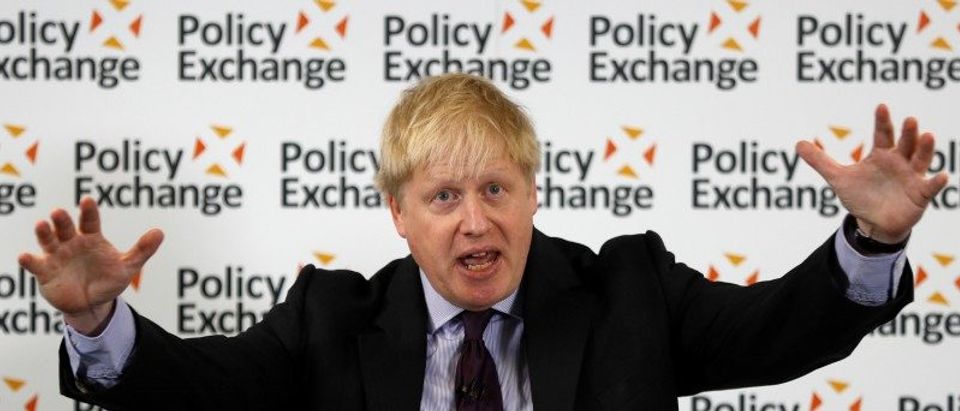“Jean Claude’s the boss here,” are the words with which United Kingdom Prime Minister Boris Johnson ended his press conference alongside the European Commission President on Thursday.
He was trying to get reporters to calm down as they shouted their questions following the announcement of the “new deal” between Britain and the EU just two weeks before the next deadline.
But while the British prime minister was only being polite in trying to quell the chuntering of the press, he may have failed to belie the truth about his “great new deal.”
But it’s not great. It’s not new. And it’s not a deal. (RELATED: KASSAM: The Queen Just Saved Brexit By Neutralizing Parliament)
The “TL;DR” version: this is former Prime Minister Theresa May’s deal without the reviled Northern Irish “backstop,” meaning Boris can return to Westminster claiming a victory in keeping the U.K. together under the U.K. customs area. It’s not entirely true, and scarcely a victory even if it were.
Northern Ireland remains one foot in-one foot out: one of the reasons the Conservative Party allied Democratic Unionist Party (DUP) has already refused to support the agreement.
Many of the original problems with May’s old deal still exist: taxation, regulatory alignment across the Irish sea, the $39 billion “divorce bill,” the U.K.’s exposure to the European Investment Bank, the list goes on. New problems have also emerged vis a vis Northern Ireland.
A half-in half-out situation arguably bolsters the argument for the independence movement in Scotland (again), although English sentiments are now less favorable to keeping the Scots in the union since the last referendum in 2014.
Boris is gaining support of some Conservative Party Brexiteers like Steve Baker and Jacob Rees-Mogg, but he has failed to convince Brexit Party leader Nigel Farage who said he would prefer another extension and a U.K. general election in order to gain Brexit Party MPs and force a “no deal” or “clean break” Brexit.
That would be a true manifestation of what Britain voted for on June 23, 2016. But there’s so much Brexit fatigue that Farage’s move has many Brexiteers wondering why he opposes leaving under these circumstances. They have resigned themselves to the fact that this deal is better than no deal. But that’s not true.
As Nigel told me in a phone call this morning, “I’ll give Boris some credit. It’s no longer the worst deal in history, like Theresa May’s, it’s the second worst deal in history.”
The big sticking points include the “political declaration,” released on Thursday, which expresses a mutual U.K.-EU desire to come to a free trade agreement within the next few years. This means the U.K. would need to stay within regulatory alignment with the EU.
Adopting the standards of a foreign power in order to trade with them isn’t “independence,” and there’s little to no chance of the EU compromising on their regulations for Britain’s sake — same as being a member state.
Really, the only actual Brexit is a “no deal” Brexit, which parliament has used all kinds of chicanery to avoid over the past three years.
And parliament is Boris’s next big hurdle.
The House will sit on Saturday to approve or reject the deal, with the Liberal Democrats, the Labour Party, the Scottish National Party, and the DUP all already in opposition. (RELATED: KASSAM: Trump Transcript Shows Him Trying To Stop Corruption, Nothing Else)
Boris will also need the support of members of Parliament he recently withdrew the whip from and kicked out of his party for not supporting him. This spells further angst.
And to add to the confusion, European Union Prime Minister Jean-Claude Juncker told reporters there would be no further extension, despite the U.K. Parliament passing the Benn Act which compels the prime minister to request another three month extension in the event that parliament rejects his deal.
If there really is no extension, that means a hard Brexit on Oct. 31, and reasons to be jubilant about Britain’s newfound independence.
But the decision isn’t Juncker’s to make. It takes the approval of the other 27 heads of EU member nations to agree on such a thing. Would Angela Merkel or Emmanuel Macron really allow the EU to “crash out,” as the BBC loadedly puts it? One wonders.
Boris’s agreement only makes sense if the options are this deal, or remaining in the European Union. But three years after the largest democratic expression resulted in a “Leave” vote, how could Brexiteers possibly accept such a premise?
No, Boris isn’t pursuing a declaration of independence with this deal for Britain. It’s more like being on the losing side of the Treaty of Paris again. But this time we didn’t lose a war, so why are we surrendering?
Raheem Kassam (@RaheemKassam) is a former adviser to Brexit leader Nigel Farage and author of two bestselling books: “No Go Zones” and “Enoch Was Right.”
The views and opinions expressed in this commentary are those of the author and do not reflect the official position of The Daily Caller.


